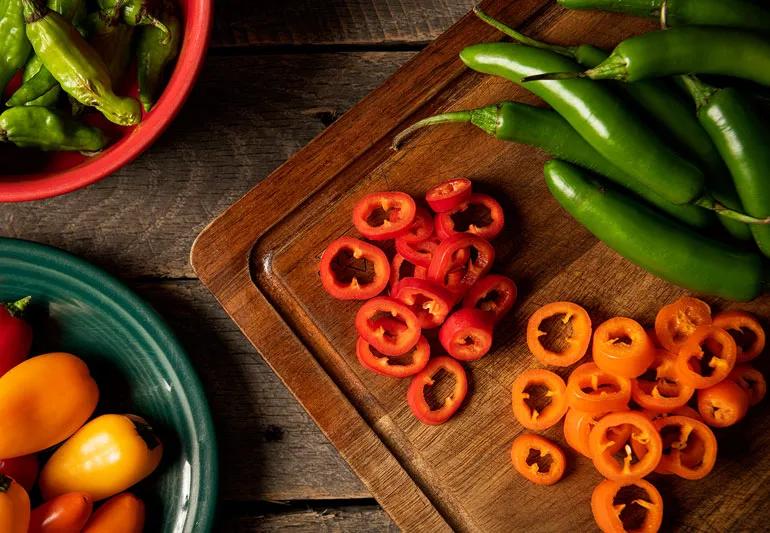The health benefits of fiery foods

If spicy foods fan your flames of hunger, you’re in luck: Peppery meals do far more than make your tongue tingle and forehead sweat. There’s evidence that food with a kick can help you lose weight, boost heart health and – surprise! – aid your gastrointestinal system.
Advertisement
Cleveland Clinic is a non-profit academic medical center. Advertising on our site helps support our mission. We do not endorse non-Cleveland Clinic products or services. Policy
“Spicy food is a hot topic in nutrition — no pun intended,” says Patricia Bridget Lane, a registered dietitian/nutritionist.
So let’s dig in to get a taste of how hot-and-spicy dishes can benefit your health.
That habanero salsa definitely makes your mouth burn. Could it burn calories, too? It sounds strange, but it’s not that far-fetched. Research shows that people who eat more spicy foods are less likely to have a BMI > 30 (have obesity) or a BMI > 25 (have overweight).
Increasing your spice intake could help with weight loss in a couple of different ways:
Much of the research on spicy foods focuses on capsaicin, the compound that gives chile peppers their kick. Some of that research has found that capsaicin boosts the body’s ability to break down fat and burn more energy.
“It seems to rev up the body’s fat-burning mechanisms,” says Lane. “That can help with weight loss and weight management.” (Read what an endocrinologist says about metabolism’s role in weight loss.)
Chiles and other spices might also affect your hunger. “There’s some research that capsaicin acts on the hypothalamus — the part of the brain that controls hunger and fullness,” Lane says. So you may feel full sooner if you add some heat to your meal.
Advertisement
“People who eat a diet rich in spicy foods tend to eat less food overall throughout the day,” she adds.
Dousing your dinner in hot sauce may have benefits besides weight management:
By helping break down the fats in foods, spices may boost heart health. Some studies have shown that fiery fare may reduce the risk of diseases such as high blood pressure, high cholesterol and Type 2 diabetes.
A study from the University of Vermont found that people who regularly ate chile peppers had a 13% lower likelihood of death. The researchers found that these culinary fire eaters were less likely to die of cardiovascular causes like heart attacks and stroke.
Fiery foods might sound like a bad idea for someone with a sensitive stomach. But there’s evidence that capsaicin might actually be good for the microbiome in your gut.
The microbiome is a community of bacteria and other microbes that are important for immune function and other aspects of health. “Capsaicin can stimulate a healthy gut flora and have a positive effect on the gastrointestinal tract,” Lane says.
Hot-and-spicy dishes might also reduce inflammation. There’s evidence that capsaicin can help combat low-grade inflammation in the gut — a type of inflammation that has been linked to obesity.
Capsaicin’s inflammation-fighting powers extend beyond the belly, too. Over-the-counter capsaicin cream can help treat pain ranging from arthritis and fibromyalgia.
Before you start buying hot sauce in bulk, Lane offers a few caveats. Even the hottest chile peppers can’t undo the damage from a poor diet heavy on sugar, processed foods and saturated fats.
“While spicy foods might have benefits, it’s more important to consider your overall diet,” she says.
In other words, adding spice to a veggie stir fry is a great idea. Ordering an extra side of deep-fried buffalo chicken wings? Maybe not. “If you aren’t eating a healthy, balanced diet, spicy foods alone won’t rev up your metabolism or lower your cholesterol,” she says.
And not all spice is created equal, she points out. Whole chile peppers and dried chile powder are great pantry staples. But many hot sauces and packaged seasonings are high in salt or other ingredients that you should only consume in moderation. Salt contributes to high blood pressure, so read nutrition labels before you get saucy.
If you’re not used to spicy foods, start slow. “If you aren’t used to a lot of spice, don’t start with habanero peppers,” Lane suggests.
Advertisement
Overdoing it can make your mouth burn — and may cause diarrhea. There’s no need to shoot for the world’s hottest chile. “You don’t necessarily need a lot of spice to reap the benefits,” says Lane.
But if the world’s hottest pepper sounds intriguing to you, here’s some good news: If you keep eating spicy foods, it’s likely your heat tolerance will increase over time. Lane says to have fun with it and explore recipes featuring peppers.
“But no matter how much spice you add,” Lane says,” remember that the goal is still a balanced diet.”
Advertisement
Learn more about our editorial process.
Advertisement

The tropical fruit is a good source of antioxidants and vitamin C

High amounts of cholesterol and saturated fat in red meat may be linked to heart disease

The leaves and pods from this tree are rich in essential nutrients

This starchy root vegetable is a staple in many global cuisines — but it has to be prepared correctly, or it can cause serious concerns

These delicate green sprouts can give you an extra dose of vitamin K and other nutrients — but they’re not safe for everyone

Edamame, lentils and chicken breast are good sources of protein

Eating this root vegetable can help support your eye, heart and brain health

The flavorful herb is full of antioxidants that may help regulate blood sugar

Wearing a scarf, adjusting your outdoor activities and following your asthma treatment plan can help limit breathing problems

Your diet in the weeks, days and hours ahead of your race can power you to the finish line

When someone guilt trips you, they’re using emotionally manipulative behavior to try to get you to act a certain way